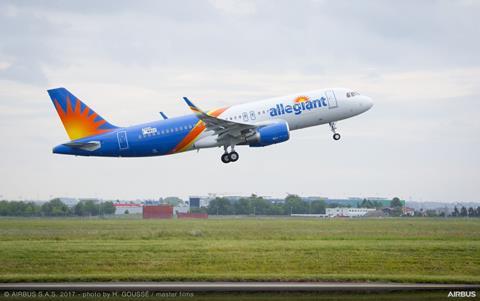Allegiant Air says that its laser-focus on underserved routes, the most popular travel days of the week and cost-conscious leisure travellers will be key to pulling itself out of the coronavirus crisis.
The Las Vegas-based carrier typically flies to routes to secondary destinations which are not served by any other carriers, on the four days of the week where travel volume is highest.

“We are a Thursday, Friday, Sunday, Monday airline,” the carrier’s chief financial officer Greg Anderson tells the International Aviation Forecast Summit in Cincinnati 12 October. Only 12 of its 5,000 flights during the month of September operated on Tuesdays – the day of the week when the least leisure travellers tended to be underway, he adds.
In addition, on 83% of its non-stop routes it is the only carrier to connect those two cities, Anderson says. “A lot of the airports we serve - we are the only game in town and that’s been effective for us to keep costs low.”
Most of the airline’s flights are to or from the USA’s most popular vacation destinations in Florida, in the southeast of the USA,or in the western sun states of California, Nevada and Arizona. The airline has no international destinations.
With an all-Airbus fleet of used aircraft, Allegiant also has shown the lowest monthly cash burn out of all major and low-cost carriers in the United States during the coronavirus crisis, estimating that during the fourth quarter it will burn about $23 million per month.
Like its peers, Allegiant was forced to furlough some employees after the government’s payroll support programme expired last week without an extension. So far, the airline says it is in the process of furloughing 200 pilots but most other work groups remain intact.
Allegiant’s Anderson also says that the airline is clearly seeing pent-up demand from customers who had been prevented from traveling earlier this year due to lockdowns and other restrictions. He says the airline is “encouraged” by forward bookings for the upcoming Thanksgiving and holiday season.
“We are not running out and claiming victory today, but we think there’s a line of sight to get out of the cash burn narrative,” he says.
Aviation analyst Michael Boyd, speaking at the International Aviation Forecast Summit in Cincinnati on 12 October, says that the point-to-point model that ultra-low-cost carriers like Allegiant specialize in will likely be one that rebounds the fastest from the global pandemic, which has devastated air travel.
Mainline carrier United Airlines recently introduced numerous point-to-point flights to try to draw more of the leisure market to its own network as business travelers continue to stay away.
In August, the Chicago-based carrier said it was launching 28 new flights between seven non-hub cities in the Midwest and the Northeast USA to four popular warm-weather destinations in Florida beginning on 6 November - just as the winter arrives and passengers who sheltered in place for most of the spring and summer are thinking about a possible vacation getaway.
The airline said at the time that the new routes ”reflect United’s continuing strategy to aggressively and opportunistically manage the impact of Covid-19 by increasing service to destinations where customers most want to fly”. Thereby it hopes to draw traffic away from passenger carriers that are traditionally strong in those markets, such as Spirit Airlines and JetBlue Airways.


























